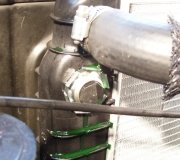Hi,
There are several potential reasons why engine oil could get into the intake manifold. Most commonly, there is excessive crankcase pressure being produced by engine wear. This allows the PCV to vent oil vapors into the intake.
Here are a few possible causes:
Failed PCV (Positive Crankcase Ventilation) System: The PCV system is responsible for routing crankcase gases back into the intake manifold to be burned in the engine. If the PCV valve or other components in the system become clogged or malfunction, it can cause excessive pressure to build up in the crankcase, leading to oil being pushed into the intake manifold.
Worn or Damaged Valve Seals: The valve seals prevent oil from entering the combustion chambers from the top end of the engine. If these seals become worn or damaged, they may allow oil to leak past them and enter the intake manifold.
Faulty Piston Rings: The piston rings create a seal between the piston and the cylinder wall, preventing oil from entering the combustion chamber. If the piston rings are worn or damaged, they may allow oil to pass by and end up in the intake manifold.
Overfilled or Contaminated Oil: If the engine oil is overfilled, it can cause excessive pressure within the crankcase, leading to oil being forced into the intake manifold. Additionally, if the oil is contaminated with coolant or fuel, it can result in oil being pushed into the intake manifold.
I need you to try something. When the engine is running, remove the oil fill cap and see if there is excessive pressure coming from it.
Also, a film of oil can be found on many vehicles. I would first clean the throttle body. See if that resolves the stalling problem. Here is a link that explains how to do it.
https://www.2carpros.com/articles/throttle-actuator-service
Try that and let me know the results. Also, if you have other questions, let me know.
Take care,
Joe
Thursday, June 29th, 2023 AT 10:52 PM


